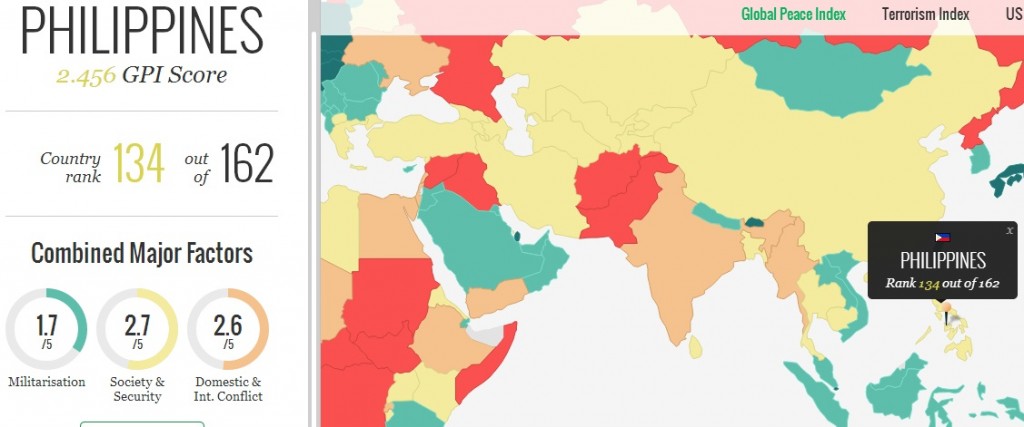Peaceful progress still elusive in PH – study
MANILA, Philippines—Despite strong economic growth, corruption and patronage politics are holding back the Philippines from achieving peaceful progress, the 2014 Global Peace Index (GPI) study by the Institute for Economics and Peace (IEP) found.
“While in many ways exhibiting strong democratic credentials, the Philippines ranks just 134th out of 162 countries in the GPI,” the study said.
The Philippines rank dropped five places since the 2013 GPI.
“Corruption, poverty and the patron-client nature of relations in the Philippines means that problems exist across all levels of society—not just in areas under conflict—with high levels of violent crime and kidnapping,” it said.
The IEP defines “peace” as “the absence of violence and fear of violence” and measures 162 countries in the study.
“The GPI is a composite index that measures peace based on 22 qualitative and quantitative indicators, ranging from a nation’s level of military expenditure to its relations with neighboring countries and the percentage of prison population,” IEP said in its website describing the methodology of the study.
Among the 10 member nations of the Association of Southeast Asian Nations (Asean), Philippines is the second lowest in the GPI ranking just above Myanmar which is rank at 136th.
Thailand ranks 126th, Cambodia 106th, Indonesia 54th, Vietnam 45th, Laos 38th, Malaysia 33rd, and Singapore 25th. No data was available for Brunei.
An interactive map showing the rank of countries all over the world can be found in the following link: https://www.visionofhumanity.org/#page/indexes/global-peace-index/2014
The IEP, an international non-profit think tank with headquarters in Australia, cited corruption and patronage politics as the root cause of the decades-long conflict and violence in Mindanao.
“Corruption in the Philippines is widespread—the country scores 36 out of 100 on Transparency International’s 2013 Corruption Perceptions Index—and there is a widely held belief that graft among the elite is the reason why poverty rates and income inequality have remained very high by regional standards, despite strong economic performance in the past decade,” the study said.
“The patron-client nature of underlying relations also plays a role. These relationships can distort the allocation of resources away from the areas where they are most needed, or could be used most effectively,” it said.
Wealthy political families fight over each other in their desire to retain power and influence that they get through patronage politics. IEP cited the case of the 2009 Maguindanao massacre which was the result of the rivalry between the Ampatuan and Mangudadatu clans.
“This is also reflected in the Democracy Index, where the Philippines only scores 3.13 out of 10 for political culture” the study said.
Corruption has also led to the ineffective functioning of the Autonomous Region of Muslim Mindanao (ARMM) and kept the region from progress despite substantial fund allocations.
The controversial Priority Development Assistance Fund (PDAF), also known as Pork Barrel, was among the “barriers to peace” cited by the study calling it an “important” but “insufficient” step forward.
“The abolition in 2013 of the so-called pork-barrel system was an important, albeit insufficient, step towards ensuring that the allocation of public funds is rationalized and politics becomes less personalized,” the study said.
“However, the strengthening of political parties and local governments’ capacity to deliver basic services will be crucial going forward,” it said.
Maritime dispute
The ongoing tension between the Philippines and China over the disputes in the South China Sea has also contributed to the low rank of the Philippines in the GPI.
“The Philippines’ relations with China have deteriorated in the past few years, as the Chinese government has become more assertive in its claims over various parts of the South China Sea (SCS), areas of which are also claimed by the Philippines,” it said.
The study cited the Philippines filing of an arbitration case before the International Tribunal on the Law of the Sea (ITLOS) challenging China’s nine-dash line claim over 90 percent of the South China Sea.
“The move, which China said ‘seriously damaged bilateral relations’, was a risky one and could result in a long-term estrangement between the two sides. As a consequence, the Philippines score for relations with neighboring countries deteriorated this year,” the study said.
China continues to refuse to participate in the proceedings and insists on bilateral negotiations.
RELATED STORIES
Irrigation officials in Caraga region face graft,corruption
Is there corruption without personal gain?

